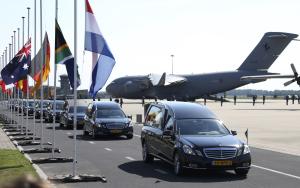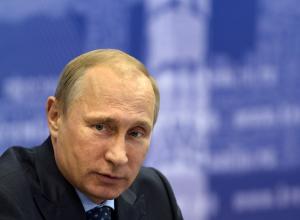MOSCOW (AP) -- Having for months dismissed Western sanctions on Russia as toothless, business leaders here are now afraid that the downing of the Malaysian jetliner will bring about an international isolation that will cause serious and lasting economic damage.
Throughout the Ukrainian crisis, U.S. and European sanctions had mainly targeted a handful of individuals, sparing economic ties. Then last week the U.S. imposed penalties on some of Russia's largest corporations. And when the airliner was shot down just a day later in Ukraine, allegedly by separatists with Moscow's support, concern grew in Russia that the sanctions would only get worse as President Vladimir Putin shows little sign of cooperation.
Reinforcing those concerns, the European Union said Friday it is planning newer, tougher penalties on businesses.
"Over the past few months, there was a sense that Mr. Putin acted decisively, forcefully, and correctly, and that everybody else in the world would accommodate themselves to that reality and we'd get back to something like business as usual," said Bernard Sucher, a Moscow-based entrepreneur and board member of Aton, an independent investment bank. "Now we're talking about real fear."
It's not clear how quickly that fear and the country's overall economic pain might soften Putin's foreign policies. He keeps tight control over business leaders and still enjoys a high popularity rating. But some analysts note the fear of tougher sanctions may in fact already be having an impact, for example by keeping Russia from trying to annex eastern Ukraine the way it did with Crimea in March.
After that move, which triggered a deep freeze in relations with the West, stock markets in Russia dropped only to later rebound as investors understood the country's trade relations would remain largely unscathed. Europe, which is in frail economic health, dared not block energy imports from Russia or the trade in goods such as cars. Oil companies like BP and ExxonMobil continued their operations in Russia, with some even signing new deals.
View gallery

The convoy of hearses with the remains of the victims of Malaysia Airlines MH17 downed over rebel-he …
The U.S. took a tougher stance, but until last week was also careful to limit sanctions to asset freezes on individuals who were perceived to have had a hand in destabilizing Ukraine.
On July 16, the night before the Malaysia Airlines jet was shot down, Russian markets appeared to have fully recovered, with the MICEX stock index adding 23 percent since March 1.
Then last week, the U.S. announced new sanctions that had investors in Russia fear a turn for the worse. The U.S. shut off its financial markets for a broad swath of defense companies as well as Russia's largest oil company, Rosneft, gas producer Novatek, which is half-owned by a close Putin ally, and a major bank, VEB. The move offered business executives a glimpse of what they had thought would never happen: serious international isolation.
According to Alexis Rodzianko, president of the American Chamber of Commerce in Russia, those sanctions were the first to really pack a punch because they were "broader and more specific: they went beyond the symbolic."
Rodzianko said anecdotal evidence suggests some investment decisions were delayed, "particularly when people were just considering coming in to the market."
When the Malaysian airliner went down one day later, investors worried conditions would deteriorate further.
The stock market has fallen over 6 percent since Thursday last week. Investors keep pulling money out of the country. They withdrew $74.6 billion in the first six months of the year, a figure forecast to reach $100 billion for the whole of 2014 — almost twice the $60 billion in withdrawals seen last year.
Growth, meanwhile, is nose-diving. The International Monetary Fund this week slashed its forecast for 2014 from 1.3 percent to 0.2 percent. And the currency is unstable — Russia's central bank on Friday raised its key interest rate by half a point to 8 percent, saying the heightened geopolitical risks are putting pressure on the ruble.
Even the world of sports has been drawn in. FIFA, the governing body for world soccer, faced calls from German lawmakers to move the 2018 World Cup from Russia, but swiftly rejected the notion.
EU countries, meanwhile, are stepping up the pressure. On Friday they reached a preliminary agreement to follow the U.S. in sanctioning businesses. Officials said the deal, which has yet to be finalized, would limit trade in key sectors like defense and technology. It would also restrict access to European capital markets for Russian state-owned financial groups. Last year alone, 47 percent — or 7.5 billion euros ($10.2 billion) — of all the bonds issued by such institutions came from EU markets.
View gallery

FILE - In this Monday, July 21, 2014 pool file photo Russian President Vladimir Putin listens durin …
Despite all this, there is little public criticism in Russia — none at all from those with the most at stake, the oligarchs.
Russia's biggest companies denied comment for this story. One spokesman said he was not authorized even to say a "no comment" for an article about sanctions.
A person who had close ties to the government until last year told The Associated Press that it is "too risky to express concerns in public and even in closed-door meetings with Putin." The person, who spoke only on condition of anonymity for fear of retribution, said tycoons usually express their concerns to government officials who in turn communicate them to the president.
That silence has been a hallmark of Putin's rule. In the early 2000s, he forged a deal with Russian businessmen in which the Kremlin offered its protection for the often murky deals that created the oligarchs' fortunes. In return, the tycoons promised to not meddle in government policy. The only man who broke this rule — Mikhail Khodorkovsky, once Russia's richest man — was punished with two sets of charges and spent 10 years in prison before he was pardoned by Putin a month before the showcase Winter Olympics held in Russia.
In public, Putin appears unfazed by the sanctions. In a speech Tuesday, he suggested Russia should accept to sacrifice economic growth for the sake of foreign-policy objectives — a nightmare scenario for a business leader hoping to tap global markets.
But analysts note that for all his belligerent rhetoric, the Russian leader has softened on some fronts in Ukraine.
Though the first sanctions, which targeted Putin's billionaire friends, were perceived as a failure, they did work in the sense that Russia did not annex any other parts of Ukraine the way it did with Crimea, says Sergei Guriev, a prominent Russian economist now working at Sciences Po university in Paris. They also "forced the Russian government to recognize Ukrainian elections," he said.
It is unclear how long it would take for the latest sanctions' effects to trickle down and affect the wallets of ordinary Russians, who have basked in the prosperity that has characterized the Putin era and that is a key part of his high support.
Putin's support among the electorate has been as high as 80 percent this year, driven in part by a wave of chauvinism after Russia's annexation of Crimea. Serious economic contraction could pare down his approval rating, though it's likely to remain strong.
"The crisis within and over Ukraine will continue even as a vast majority of the Russian people will continue to support President Putin, and will see the United States as an adversary, even an enemy of Russia," Dmitry Trenin, director of the Carnegie Moscow center, wrote in a commentary this week.
Putin seems to be in a balancing act, seeing how far he can pursue his geopolitical interest in Ukraine without getting hit too hard by sanctions. But the U.S. and EU's level of tolerance seems to have dropped since the Malaysian plane's downing, increasing the risk of further damaging sanctions on Russia's economy.
Russia's former long-time finance minister Alexei Kudrin blames a part of the Kremlin's elite for seeking to isolate the country internationally.
"Business wants development, wants to invest, build new factories, trade," Kudrin said in a recent interview with the Itar-TASS news agency. "And businesses are really worried about what they hear on radio and television."
___
Jim Heintz in Moscow and John-Thor Dahlburg in Brussels contributed to this report.